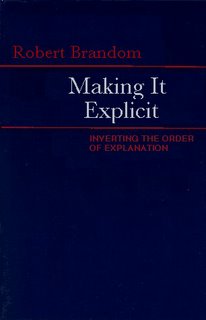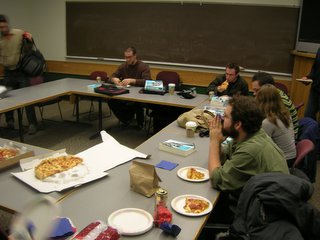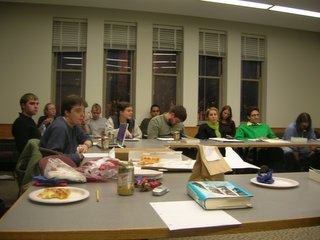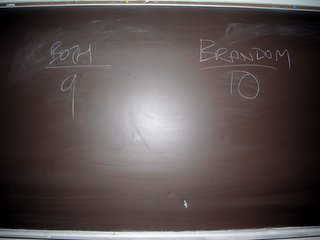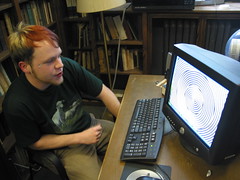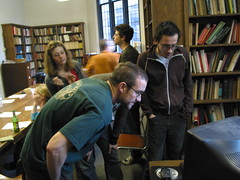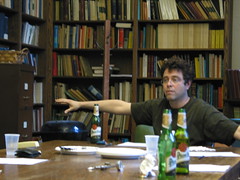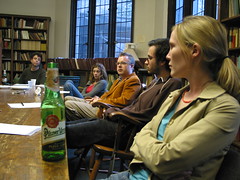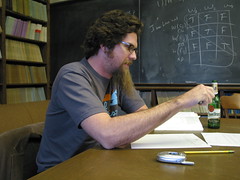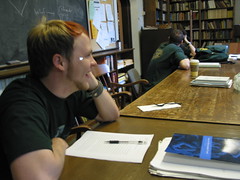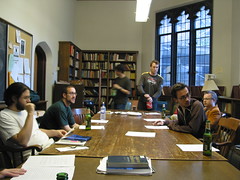Tonight the workshop met in Cobb 103 to discuss the last part of chapter one and the first three parts of chapter two of Brandom's Making It Explicit.
David F. wasn't at the workshop tonight because he was sick, but Jason B. did an admirable job steering the workshop in the direction of the truth. Or at least the truth about Brandom.
PART I: INTRODUCTION
Jason B. said that he would open discussion by raising three potential topics to discuss arising out of the sections of Making It Explicit we read for this workshop (Chapter 1, part VI, and Chapter 2, parts I-III):
1. Jason B. claimed that Brandom was offering a transcendental argument to the effect that a certain conception of norms implicit in practice was required to fix a certain interpretation or application of a rule. Jason reminded us that there are nagging questions about whether Wittgenstein would endorse such a project: John McDowell and David F. and others (possibly many members of the workshop, including Ben M.) would say that Wittgenstein would want us to stop the regress from even getting started, so there is nothing to stop, and no need for any theoretical apparatus to do the stopping. And Brandom's appendix to chapter 1 indicates that his notion of a "rule" is much more restrictive than Wittgenstein's notion of "rule". This by itself suggests that Wittgenstein has something different from Brandom in mind when he talks about the interpretability of rules.
2. Brandom wants to endorse a kind of interpretationism akin to Dennett's "stance stance", while rejecting Dennett's view that there is no original intentionality, only derivative intentionality. But if all intentionality is (in some sense) dependent on interpretation, then how can there be original intentionality (understood as a kind of intentionality that something has in virtue or something already with intentionality)? On the face of it, this looks paradoxical.
3. On Brandom's understanding of pragmatics and semantics, "semantics must answer to pragmatics" (83). We work out the content of subjects' utterances and mental states by paying attention to how subjects act and infer. Because the pragmatic attitudes (belief, desire, intention, etc.) matter for action and inference, we therefore cannot have an independent grasp on the propositional content of those attitudes without understanding their pragmatics. Brandom wants to contrast this view of content with "representationalism", an attempt to explain pragmatics in terms of propositional content. Jason B. asked who, if anyone, would count as a representationalist. Who is Brandom arguing with here? Surely no (or very few) contemporary philosophers count as representationalists in Brandom's sense. Jason B. also asked whether Brandom's arguments targeted only the designative version of representationalism (an extreme version of representationalism that holds that content should be understood on the model of the designating relation between singular terms and the objects they stand for).
PART II: INTERPRETATIONISM AND THE COMMUNITY
Jay E. opened discussion with a characteristically intelligent observation concerning topic #2, Brandom's version of Dennett's interpretationism. Recall that Jason B. said that Brandom's position seems prima facie paradoxical because he accepts (i) Original intentionality (which Jason glossed as the claim that not all intentionality depends on something already with intentionality) and (ii) Interpretationism (which was glossed as the claim that all intentionality depends on being interpreted). How are (i) and (ii) supposed to hold together? Jay suggested that Brandom suggests another "implicit" social response to this problem analogous to the solution he proposes to the rule-following paradox (the presence of the word "interpretation" here as in the rule-following considerations might also lead one to think such an analogy holds). Maybe, if the interpretations that are constitutive of intentionality are implicit in practice they can somehow constitute original intentionality? Though this sounded plausible as a description of what Brandom is up to here, no one felt this move was very satisfying. I could feel everyone wanting to say, with furrowed brows: "but how is making the interpretations implicit supposed to help anything?" Those members of the workshop more familiar with Brandom's work pointed out that the answer to this question is something that gets worked out "later in the book". So, we'll have to wait and see how norms implicit in practice are supposed to help avoid the seeming paradox that comes with accepting both original intentionality and interpretationism. (Ben M. was perhaps the least optimistic member of the workshop about the possibility of making these claims consistent.)
Will S. then raised a question about Brandom's comment on p. 61 that it is the community that is assigned original intentionality. What about Brandom's earlier comments about not assigning mental states to super-personal entities? Don't these remarks look inconsistent?
I feebly responded that Brandom does distinguish between the I-we and the I-thou understandings of the community, and he criticizes only the former for assigning mental states to a collective. So maybe the community he thinks can be ascribed original intentionality is some arrangement of I-thou relations. Jason B. criticized this proposal: either the thou in the I-thou relation is another individual, in which case there is no community, or the community is the I-thou relation itself, in which case we are still assigning intentionality to a collective, rather than an individual.
At this point, Jason B. gave a taxonomy of four different possible views of the proper role of the community in relation to intentionality (all of these are rough thumbnail sketches, obviously):
- Crispin Wright's "regularism": Whatever the community agrees is correct action is correct action. Deviations from the normal way of going on count as mistakes.
- John McDowell's "community as background condition": A necessary condition for intentionality is being a member of a community of a certain sort, where there are normal ways of going on, forms of life, agreements in judgments, etc. How people do in fact act is not all there is to correctness and incorrectness, however, but that they act in regular ways is a necessary condition for mindedness.
- Dan Dennett's community of interpreters: in order to have intentionality, a thing must be fruitfully interpretable (that's shorthand for: it must be intentionally interpretable in a way that more effectively predicts its behavior than physical or design interpretation predicts its behavior), which requires an interpreter (though might not that interpreter be the thing itself?). The "community" here seems to play a much less substantial role than it does for Wright and McDowell.
- Bob Brandom's "social intepretationism": The location of original intentionality is the community, but there will be (at least an attempt to generate) objective norms that outrun mere norms of communal agreement.
After Jason B. situated Brandom's project in relation to Wright, McDowell and Dennett, there was some concern about how Brandom's view differed from Crispin Wright's. After some discussion, we concluded that at the "ground level", Brandom's norms are Wright-like, in that they are constituted by communal agreement. But Brandom has a more ambitious project of "precipitating" objectivity out of "the social soup of norms that are whatever the community takes them to be" (54). That is supposed to be the project of the distant chapter 8.
PART III: ??
Then began a long discussion of how social an interpretationist has to be, which I feel I have only a tenuous grasp on. But I will try to reproduce the discussion as best I can.
Aiden G. initiated the discussion by pointing out that an important constraint on Dennett's intepretationism is its predictive success. Aiden then asked whether it was fruitful to think of Brandom as replacing predictive success with communal proprieties as a constraint on his interpretationism.
Jason B. raised what I took to be an objection to Aiden's suggestion about Brandom (though I'm still not sure about this). He said that there were two ways of understanding interpretationism, one which required a community and one which did not:
(1) Having intentionality consists just in correctly being interpreted and having one's behavior successfully predicted by someone adopting the intentional stance.
vs.
(2) Mere interpretability and predictability by someone adopting the intentional stance.
Jason B. said that only (1) requires an actual community of interpreters (though, again, I wonder whether even that is true: one could interpret and predict one's own behavior).
Jay E. said, in response to Jason, that one might think that even (2), mere interpretability, was something that was "socially conditioned", that is, dependent on the existence of a community to be so much as possible.
Jason said that Jay's suggestion was "clever" (meaning something like "sophistical"). Jason then said that Jay's route wasn't available to Brandom, because for Brandom interpretability just is actual interpreting.
This continued for some time.
I confess that still have trouble seeing what the significance of this dispute was for our understanding of Brandom.
PART IV: INTERLUDE
We chided Jason for pronouncing Pufendorf's name as "Puffendorf", rather than "Poofendorf", though both sound equally ridiculous to 21st century American ears.
Someone, I think Chris F., asked how we were intended to read the epigraph from Hamlet on p. 67:
Sure, he that made us with such large discourse
Looking before and after, gave us not
That capability and god-like reason
To fust in us unused.
Chris suggested that Brandom had this passage at the beginning of chapter 2 because he was reading it as meaning "no discourse without use". But I wondered about the suitability of such a reading, because (just from considering the passage as it appears in the Brandom), it seems that the "large discourse" belongs to "he that made us", not to us. So I think the better reading of Brandom's intention here is something like "no reason without use".
PART V: SEMANTICS AND PRAGMATICS
At this point in the workshop, we turned to Jason's third concern raised at the beginning of the workshop: who counts as a representationalist? Remember that a representationalist is someone who "envisage[s] an explanatory strategy that starts with an understanding of representation and on that basis explains the practical proprieties that govern language use and rational action" (p.69). While Brandom says that this is a "common response" to the insight that intentionality has a representational dimension, we could only find a handful of examples of philosophers who would count as such: Descartes (p.73), Meinong (p.71) and maybe Fodor (though it was pointed out that in the Elm and the Expert Fodor develops a view of inference that might even disqualify him from counting as a representationalist in Brandom's sense). And Jason B. said that charging Descartes with failing to clarify the "the content of the representational commitments to which the mind's entitlement is at issue" (p.73) is a bit anachronistic.
I pointed out that even if you think almost no contemporary philosophers are representationalists in Brandom's sense, so everyone is in some sense a pragmatist, Brandom's own inferentialist view (p. 94) according to which the representationalist order of priority is reversed, will be something that almost everyone disagrees with. So there will be plenty of fodder for discussion in weeks to come.
PART VI: DECLINE OF THE WEST
We ended the workshop by considering the question: Who is Rebecca West? She is credited with the irritated response to the "mind as a mirror of nature" that "one of the damn things is enough" (p. 74).
The quote that "one of the damn things is enough" also appears on p. 3 of Goodman's Languages of Art, but as a part of the phrase: "Art is not a copy of the real world. One of the damn things is enough". Goodman says in a footnote that the phrase appears in an "essay on Virginia Woolf" but that he has "been unable to locate the source".
Rebecca West was an
English critic. I think Brandom has managed to track down the source of Goodman's quote. But searching the web, I only find the less elegant quote "A copy of the universe is not what is required of art; one of the damned things is ample" attributed to West.
As far as I can tell, none of the quotes attributed to Rebecca West makes any claims about the "mind as a mirror of nature" as Brandom claims--she's talking about art.
The workshop will meet the week after Thanksgiving to discuss the rest of Chapter 2 in Making it Explicit.





